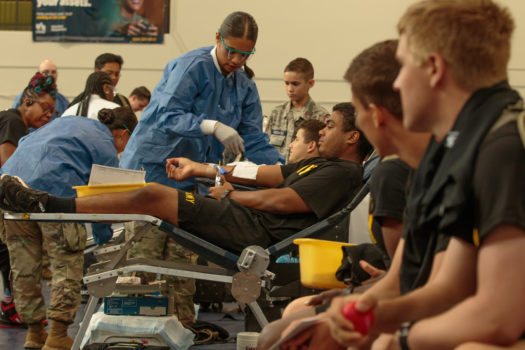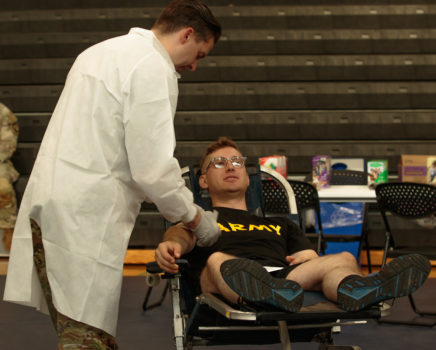FORT KNOX, Ky. – During Cadet Summer Training, Cadets from Advanced Camp, 7th Regiment, donate blood at the Armed Services Blood Program’s blood drive at Smith Gym, Fort Knox, Ky., July 31, 2023.

Throughout CST, the Armed Services Blood Program hosts multiple blood drives, giving Cadets the opportunity to potentially save lives through their blood donations. Sgt. Andrew Smith III from Fort Moore, Ga., explained why the blood drive is an important activity for Cadets to participate in.
“These Cadets are going to be our future leaders, so we want to get it in their mind that once they become commanders, they’re going to have to support the Soldiers around them,” Smith said. “It doesn’t work without people giving blood, so if it’s in their mind now, they’ll push this as leaders when they’re in control.”
Smith said that the blood the Cadets donate will be sent and given to American Soldiers that are fighting overseas. Coming fresh off completing the Field Training exercise a few days prior, Cadet Bluesmon Del Vecchio from the University of Southern California understands this idea of supporting others beyond the base level.

“When I was 18, I joined the Army, and I’ve been in the Reserves for about three years,” Del Vecchio said. “I think it’s important to not only know who your subordinates are as soldiers, but who they are as people so you can best take care of them, and they can best take care of you.”
Growing up, Del Vecchio said his father was a leader within their own community. Once he got old enough to be in a position of leadership, Del Vecchio decided to become a supportive leader, emulating his father’s behavior.
“My baseline leadership style comes from my dad. Growing up, I saw how he took care of the community around him and was a leader within that,” Del Vecchio explained. “We had a group of people around us within our neighborhood, and whenever there was a crisis, he’d be the person that they would look to go forward and find solutions.”
Del Vecchio’s father was not the only person who inspired him to become a better leader.
“My first company commander, Capt. Wilson, took care of me, and tried to promote my strengths and build up my weaknesses,” Del Vecchio said. “I was so grateful to have that right off the bat in the Army, because some people have difficulties with their leadership.”
Del Vecchio has modeled his own leadership style off those he relied on for guidance and support. Now, he has put himself in a position where others can rely on him for unrelenting support.
“Here at camp, it’s a very interesting dynamic because everyone is becoming a leader, but everyone is also leading everyone else, rotationally,” Del Vecchio explained. “When you’re in those leadership positions take charge, and when you’re not, support the person that is.”
Del Vecchio spoke about the personal growth he has achieved while being at Advanced Camp. He said that after he graduates, he wants to continue to focus on his personal strengths and weaknesses, so he can best support the people around him.
“I’ve learned where my limits were and how to push past them,” Del Vecchio said. “Before this, I didn’t ever promote strengths and weaknesses. I think there’s a value to balance, identifying both your strengths and weaknesses and continuing to improve.”




